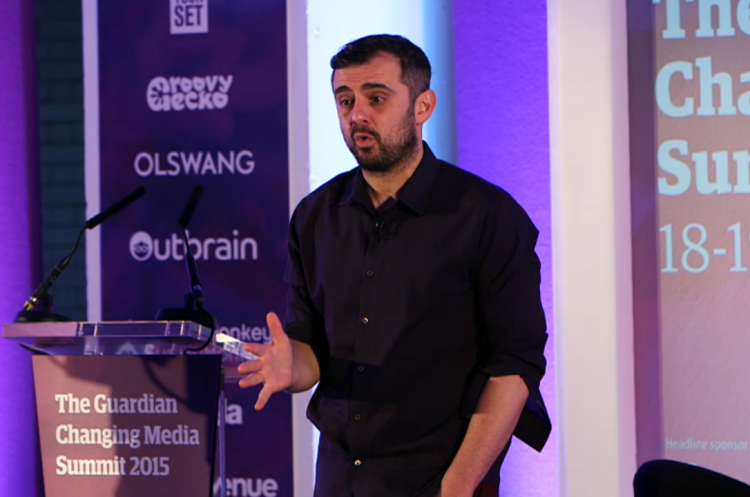If Twitter fails to fix its “noise” problem, it doesn’t face a prosperous future — that’s according to entrepreneur and early Twitter investor Gary Vaynerchuk.
Speaking at the Guardian Changing Media Summit in London today, the “storytelling entrepreneur, video blogger, self-trained social media expert and best-selling author” talked at length about how social media has changed brand-building in the digital age. Vaynerchuk touched on a number of related topics, but it was perhaps the vehemence of his Twitter views that stood out.
Juxtaposing the Twitter of “3-5 years ago” to today, Vaynerchuk noted that users once paid a lot more attention to what was being said on Twitter in general, and when they themselves tweeted, more people paid attention to them too. In the intervening years, he reckons, Twitter has “become a massive firehose.”
The New York-based entrepreneur went on to compare Twitter with Facebook, another company he was an early investor in: “If Twitter doesn’t go to [emulate] Facebook’s News Feed and stop showing you everything, Twitter will die,” he says. “Twitter will die in the same way that email open rates went from 80 percent in 1997 to 20 percent — because noise is noise.”
These email “open rates” Vaynerchuk were from his own experience running a wine emporium in the mid-’90s, where he dispatched a newsletter to a 300,000-strong army of Internet users, which wasn’t all that bad for the time. It was this family liquor store business that he had managed to transform into a $70 million online enterprise within five years, having opened his first e-commerce site in 1996.
Vaynerchuk went on to harness the power of Google AdWords in the early days (“I owned the word ‘wine’ for about 9 months”, he says), started a YouTube show on the subject of wine less than five months after the video platform launched, and went on to invest in dozens of big-name tech firms — including Uber, Path, Tumblr, and Medium. So it’s fair to say he’s been an early adopter of this thing we call the Internet.
Algorithms
How Twitter delivers its stream of information has been a topic of debate recently. While Facebook uses algorithms to decide what content appears in your timeline, Twitter has typically steered clear of that — but that is starting to change. Sponsored tweets have been showing up uninvited for a while already, and the company has been experimenting with surfacing tweets, accounts, and topics that a user hasn’t actively indicated they wish to “follow.”
This more “filtered” approach could go some way toward increasing Twitter’s stickiness for new users, and help it grow its monthly active user base from 288 million to somewhere more in the region of Facebook’s billion-plus.
Vaynerchuk also points to Facebook as a good example of how advertising has been affected by a broader media-consumption shift. With $80 billion still being spent on TV advertising “to tell you stories in commercial form,” as Vaynerchuk puts it, this is an antiquated means for brands to get their message across. It is no longer as effective as it once was, and does little more than interrupt what you really want to watch.
“It’s not 1978 anymore, where I’m sitting on a couch watching a show and I don’t have a remote control — of course I’m going to consume the commercial,” says Vaynerchuk. “[Today], even if the commercial is lucky enough to get in front of you, maybe because you dropped the remote control off the bed, every single person here grabs their phone and tweets about what they saw, or checks their email. That commercial does not have your attention. Nor does that pop-up ad, nor does that banner ad. The reason we’re seeing some success on Facebook, is because it’s naturally in your feed and it doesn’t take away your time.”
Ultimately, marketers need to start strategizing where the attention of their target audience really is — be it Snapchat, Facebook, Twitter, or Instagram.
VentureBeat's mission is to be a digital town square for technical decision-makers to gain knowledge about transformative enterprise technology and transact. Learn More

